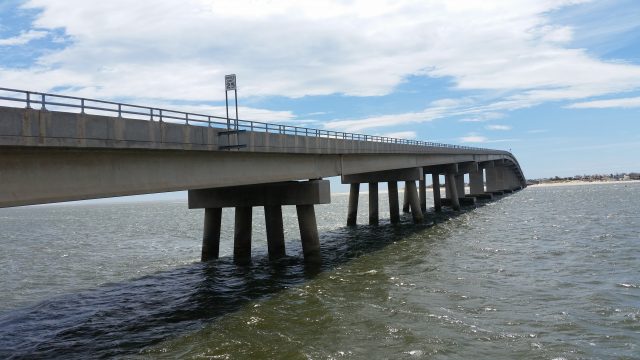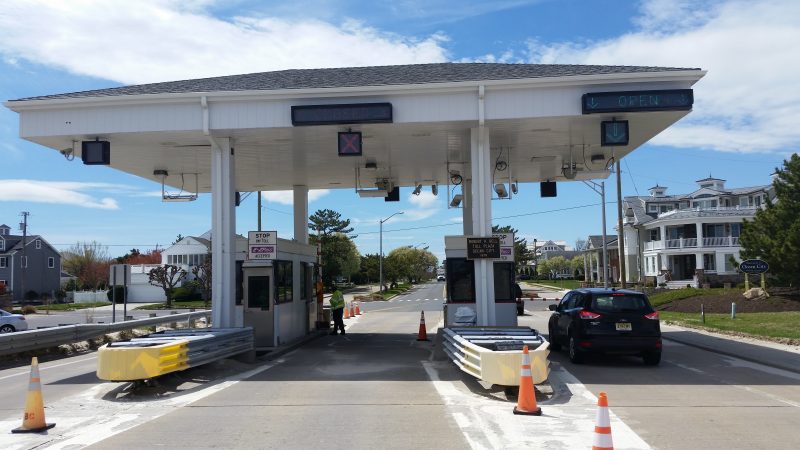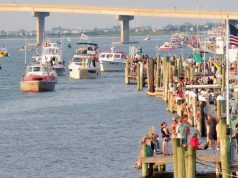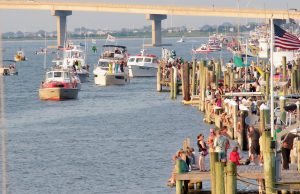
By Donald Wittkowski
The agency that oversees five bridges connecting Cape May County’s seashore towns along the Ocean Drive approved a 2019 operating budget Thursday that does not include a toll increase.
Patrick Rosenello, chairman of the Cape May County Bridge Commission, said that although there is no toll increase included in the $3.9 million budget, the agency will not rule out the possibility of a fare hike to help finance its long-range construction and maintenance projects.
“I believe a toll increase is something being considered in the future,” Rosenello said.
For now, tolls will remain $1.50 on the Ocean City-Longport Bridge, Townsends Inlet Bridge, Corsons Inlet Bridge, Middle Thorofare Bridge and Grassy Sound Bridge along the scenic Ocean Drive coastal route.
The 2019 operating budget projects toll revenue of $2.9 million for the year from the five bridges.
For the past two years, the commission has indicated that a toll increase will be required at some point to help Cape May County finance a major capital construction program, including the possible replacement of the aging Townsends Inlet and Middle Thorofare bridges.
Originally, the commission planned a toll increase in June 2017 coinciding with the expected arrival then of E-ZPass. It backed off raising tolls in 2017, though, after deciding that a fare hike during the summer tourism rush would be complicated, confusing and burdensome to motorists.
The commission encountered delays getting the automated E-ZPass toll system installed. E-ZPass became operational on all five commission bridges in the spring of 2018, about a year later than originally scheduled.

Bridge tolls have not been raised since 2009. Under the proposed 2017 toll hike, the bridge commission had wanted to structure it in a way so that year-round residents would not carry the burden of the increase.
There would have been a $1 increase in effect from Memorial Day to Columbus Day to coincide with the summer tourism season. A 50-cent toll increase would have occurred during the off-season. However, those plans remain in limbo.
Rosenello explained that the commission did not want to “commingle” a toll hike at the same time it was activating the E-ZPass system. E-ZPass continues to be fine-tuned during its first several months of operation, he noted.
“We want to get E-ZPass 100 percent up and running before we have an in-depth discussion about a toll increase,” Rosenello said during the commission’s monthly board meeting Thursday.
In the meantime, motorists have been embracing E-ZPass. On average, about 70 percent of the bridge commission’s traffic is using it. Rosenello predicted that E-ZPass usage will climb to around 80 percent within the next year. Even though E-ZPass traffic is projected to rise, Rosenello said the commission will continue giving motorists the option to pay cash for their tolls.
E-ZPass allows motorists to pay their fares electronically, saving them from the hassle of fumbling for cash or coins. It is designed to speed up the flow of traffic.
Drivers now have their choice of paying their fares using E-ZPass, cash or discount tickets on all of the Cape May County Bridge Commission spans.
The bridge commission stopped selling the tickets on Aug. 1 as part of its introduction of the E-ZPass system. The tickets, though, have no expiration date, allowing motorists to use them indefinitely, commission officials said.
Tickets cost $1.20, compared to the regular toll of $1.50, making them popular with local commuters. Lewis Donofrio, the commission’s staff engineer, estimated that motorists have been using tickets on the bridges since the 1950s.
Drivers have the option of paying with discount tickets, even if they have E-ZPass accounts. Toll-takers must manually cancel out the E-ZPass transaction to accept the tickets, slowing down the process for collecting fares.





